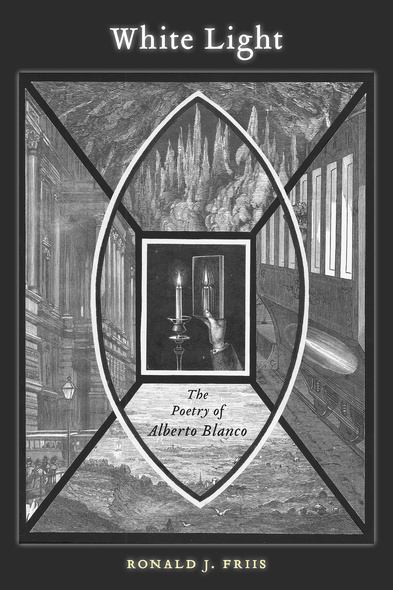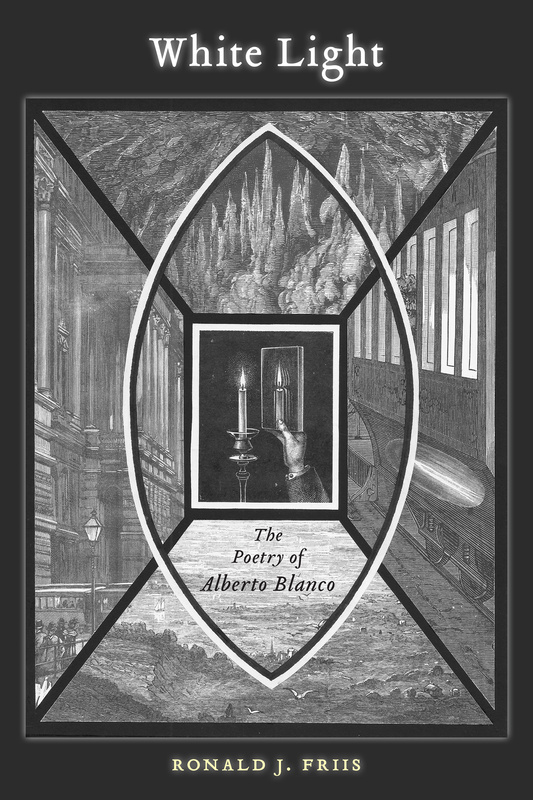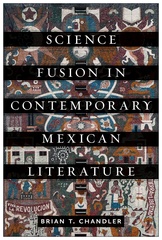
300 pages, 6 x 9
n-a
Paperback
Release Date:12 Nov 2021
ISBN:9781684483457
Hardcover
Release Date:12 Nov 2021
ISBN:9781684483464
White Light
The Poetry of Alberto Blanco
Bucknell University Press
White Light: The Poetry of Alberto Blanco examines the interplay of complementary images and concepts in the award-winning Mexican writer's cycle of poems from 1979 to 2018. Blanco’s poetic trilogy A la luz de siempre is characterized by its broad range of form and subject and by the poet's own eclectic background as a chemist, maker of collages, and musician. Blanco speaks the language of the visual arts, science, mathematics, music, and philosophy, and creates work with deep interdisciplinary roots. This book explores how polarities such as space and place, reading and writing, sound and silence, visual and verbal representation, and faith and doubt are woven through A la luz de siempre. These complements reveal how Blanco’s poetry, like the phenomenon of white light, embraces paradox and transforms into something more than the sum of its disparate and polychromatic parts.
The breadth and depth of interdisciplinary experience and influence in Alberto Blanco’s work could make approaching his poetry a daunting proposition. An accomplished artist and musician, trained chemist, and experienced translator, Blanco draws on a wide range of sources among which he rejects rigid boundaries. Ronald Friis provides not only an insightful tracing of influences, themes, and dynamics in Blanco’s poetry but also a well developed and integrated reading of critics and theory to accompany his analysis. The result is an intelligent, insightful, and accessible consideration of the work of one of Mexico’s most accomplished contemporary intellectuals, artists, and poets.
A thoughtfully organized, deep engagement that illuminates and contextualizes correspondences among Blanco’s works, as well as with his impressive constellation of literary, musical, artistic, scientific, and philosophical interlocutors, White Light serves in part as an introduction to Blanco’s decades-spanning oeuvre and as a compendium of references to secondary sources.'
The breadth and depth of interdisciplinary experience and influence in Alberto Blanco’s work could make approaching his poetry a daunting proposition. An accomplished artist and musician, trained chemist, and experienced translator, Blanco draws on a wide range of sources among which he rejects rigid boundaries. Ronald Friis provides not only an insightful tracing of influences, themes, and dynamics in Blanco’s poetry but also a well developed and integrated reading of critics and theory to accompany his analysis. The result is an intelligent, insightful, and accessible consideration of the work of one of Mexico’s most accomplished contemporary intellectuals, artists, and poets.
A thoughtfully organized, deep engagement that illuminates and contextualizes correspondences among Blanco’s works, as well as with his impressive constellation of literary, musical, artistic, scientific, and philosophical interlocutors, White Light serves in part as an introduction to Blanco’s decades-spanning oeuvre and as a compendium of references to secondary sources.'
RONALD J. FRIIS is a professor of Spanish at Furman University in Greenville, South Carolina. His publications include José Emilio Pacheco and the Poets of the Shadows (Bucknell University Press) and Doble vía: Comunicación en español (with Tatiana Séeligman).
Acknowledgments
Chronology
Introduction: Light Is Both Wave and Particle
Alberto Blanco
The Poems
Cycles
Polarities
White Light
1 Image
Collage
Absence and Negation
Poesía visual
“Donner à voir”
Ekphrasis
The Constellation of the Rose
2 Space
The Exergue Effect
Time and Place Stamps
Travel
“Mapas”
Montage and Movie Stars
Three Spatial Strategies for Cuenta de los guías
3 Sound
Sister Arts and Synesthesia
Tempo, Rhythm, and Rhyme
Musical Paratexts
Silence
4 Texture
Reading and Writing Writers
Writing Readers
Writing Writing
Hemispheres
Taijitu
The Third Half
5 Metaphysics
Scientific Methods
Observer Effects
Crisis
Lessons in Geometry
Aura
Genesis
Faith
Coda: Flight
Notes
Bibliography
Index
Chronology
Introduction: Light Is Both Wave and Particle
Alberto Blanco
The Poems
Cycles
Polarities
White Light
1 Image
Collage
Absence and Negation
Poesía visual
“Donner à voir”
Ekphrasis
The Constellation of the Rose
2 Space
The Exergue Effect
Time and Place Stamps
Travel
“Mapas”
Montage and Movie Stars
Three Spatial Strategies for Cuenta de los guías
3 Sound
Sister Arts and Synesthesia
Tempo, Rhythm, and Rhyme
Musical Paratexts
Silence
4 Texture
Reading and Writing Writers
Writing Readers
Writing Writing
Hemispheres
Taijitu
The Third Half
5 Metaphysics
Scientific Methods
Observer Effects
Crisis
Lessons in Geometry
Aura
Genesis
Faith
Coda: Flight
Notes
Bibliography
Index





